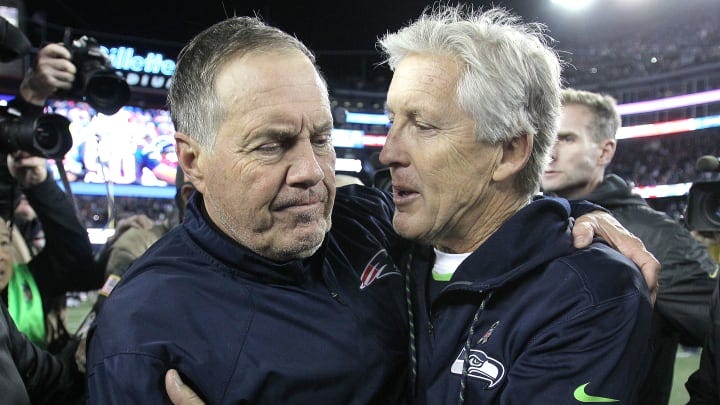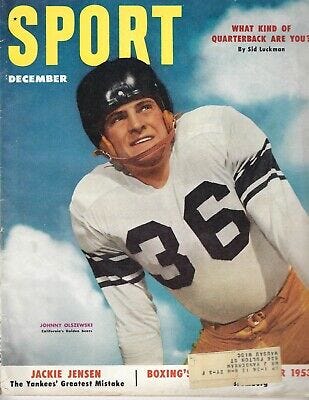"A Rah-Rah Game" (1972)
The NFL vs. college football vs. Bill Belichick.
This is Throwbacks, a newsletter by me, Michael Weinreb, about sports, history, culture and politics, and everything in-between.
If you like what you read, please click the button below, join the mailing list for FREE and please share, on social media or through e-mail or however you feel comfortable sharing.
And if you’ve been reading for a while, please consider a paid subscription to help keep this thing going—you’ll also get full access to the archive of over 200 articles. (And right now, you’ll get 20 percent off either a monthly or annual subscription for the first year.)
I.
Pro football has never been able to sell itself completely to the fans who are so wild over the collegiate version of the sport…Many people stubbornly insist upon regarding football as a rah-rah game which isn’t the same when you take away the rah-rah.—Sport Magazine, 1952
II.
In the winter of 1972, a prominent football coach found himself at a crossroads. He had been offered a million-dollar contract to leave his university and take over as coach of the New England Patriots of the National Football League. He was set to take the deal, largely because a million dollars was a hell of a lot of money in 1972. Except that something kept nagging at him. It was his sense of place in a bucolic college town; his sense of belonging to a larger academic community; his sense that college football offered a different sense of purpose than the NFL.
“I saw squads of the past, gone and graduated, grown men who write to me, who call on the phone, who come back and tell me what it was for them,” the coach later wrote in his autobiography. “And I saw the pro players, the Patriots, the Steelers, the Giants…But I saw them playing only to win. No other reason to play.”
As you might have guessed, the coach’s name was Joe Paterno, and before his career ended in ignominy, he stood out as the platonic ideal of a college football coach. In much the same way, Bill Belichick, over the course of the past two decades, has become the embodiment of a professional football coach. Those were two different occupations back then, and the question, I guess, is whether they are still two different occupations now.
III.
Everyone is running away from college football. I think Bill thinks this landscape is better for him. ... More transactional and less relational. In his mind, this is better for me.—A source close to Bill Belichick, as reported by ESPN’s Seth Wickersham.
(FYI: Seth also wrote this outstanding book on the Patriots dynasty.)
IV.
I am not sure why Bill Belichick—who accepted the head coaching job at the University of North Carolina this week—is choosing to coach a college football team, except that no one in the NFL seems to want him anymore. Part of that is most likely because he is 72 years old; part of that is because he is a professed control freak whose most crucial relationships in New England—with the team’s owner, and with his own quarterback—appeared to have frayed to the breaking point in his final years. The consensus seems to be that Belichick needed a job because if he didn’t take a job, he might never get a job, so he took this job, in large part because college football has bent so severely in the direction of professionalism over the past few years.
And perhaps it’s my own naivete, but I happen to think that college football and the NFL are still two different things. I happen to think college football is not just fundamentally and structurally different from the NFL, as The Athletic’s Stewart Mandel wrote. I happen to think there is still something about it that is spiritually different.1
V.
There is a natural temptation to liken Belichick to Nick Saban, since they served on NFL staffs together, and since they have long been friends, and since they both give off the same scent of gruff genius. But in a lot of ways, I think they are quite different, because Nick Saban understood what college football required of him, and he found a way to stay true to himself while also becoming the greatest recruiter and proselytizer in college football history. He could be that rah-rah guy when he needed to, even if he did it his own way. He understood that this is what his fan base needed from him.
In college football, you have to do a lot of talking, even in an era where money talks. You have to sell your program, and you have to sell yourself, and you have to sell the alumni who help the money flow in, and you have to sell an often-unforgiving fan base. You have to act like you care. The coach who made the most smooth transition from the NFL to college football and back again was Pete Carroll, a natural salesman. Jim Harbaugh: A sociopath, maybe, but also a pure salesman.
I have seen no evidence that Belichick is capable of performing this aspect of the job. And maybe I’m wrong about him. Or maybe it won’t matter; maybe he’ll find a way to transcend these things, but I’m not sure about that.
Belichick has insisted that he will turn North Carolina into an NFL-caliber program at every level, but the vast majority of the athletes Belichick coaches are not going to be NFL-caliber players. They will be imperfect and unformed; they will make brutal mistakes at crucial moments, and Belichick will have to accept that imperfection as part of the sport itself. And maybe he is more capable of handling this than I realize. Maybe he will find a way to accept the fact that, for many of us, the imperfection itself is what actually elevates college football above professional football. Maybe he will come to accept that his role as a college coach is fundamentally different, and that, even in this cynical age, there is still something about it that is, in fact, more relational and less transactional than the pro game.
But if he refuses to accept this reality, taking this job will not be better for him in any way. Even now in this cynical modern age, college football is not the same hard-hearted machine that pro football is. If Belichick does not shape his philosophy to account for this, then it will end in acrimony, and it will end in failure, and it will prove that as much as all this money has twisted college football into something altogether different, it still has an entirely unique soul.
This newsletter is a perpetual work in progress. Thoughts? Ideas for future editions? Contact me via twitter or at michaeliweinreb at gmail, or leave a comment below. If you enjoyed this newsletter, please subscribe and/or share it with others.
I wrote a lot more about this concept in the Reggie Bush chapter of my book, Season of Saturdays, if you’re interested.




I caught an interview with Belichick and what stuck me was his observation that today university and pro coaching are not much different. No longer do university coaches need to meet with parents and prospects in their living rooms. If prospects are looking for a NFL stepping stone, Belichick has quite the case to pitch. Incidentally, attractive prospects are looking for that stepping stone.
Well said! Extreme difference in the two games! His age set in his way ness and the changes in the college game all conspire to make this a colossal failure! If this man succeeds @ college it cements his legacy bar none! If not he’s another also ran in college still towering over the history of Pro Ball! 🏈